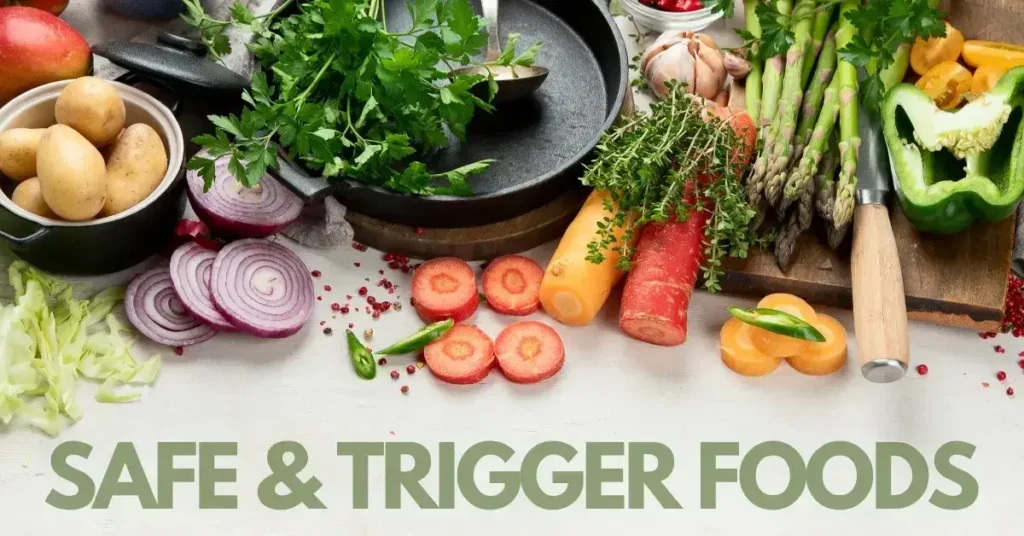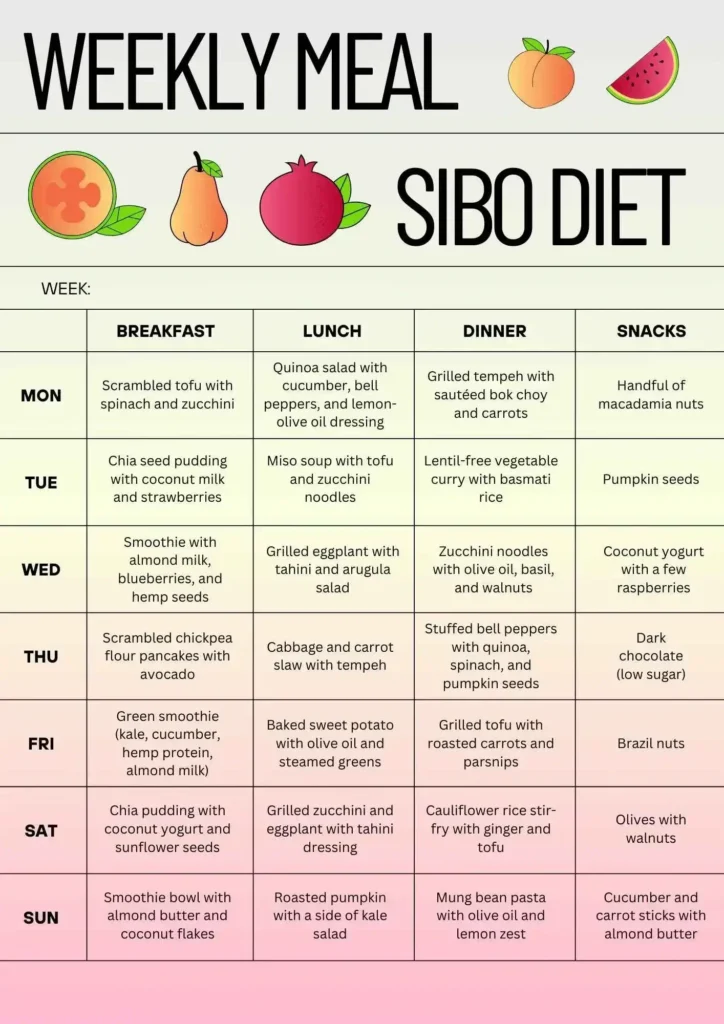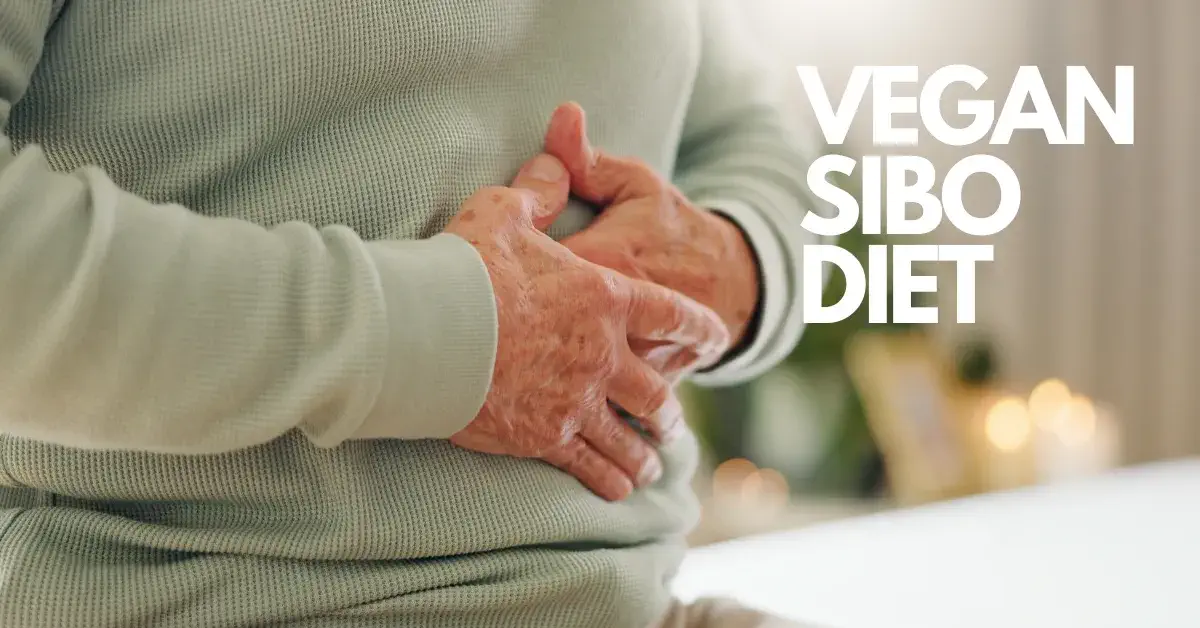A SIBO diet is designed to reduce symptoms by limiting fermentable carbohydrates that feed bacterial overgrowth in the small intestine. Traditionally, SIBO diets emphasize animal-based proteins due to their low fermentability, which can make it challenging for those following a vegan lifestyle. However, with careful food selection, a plant-based SIBO diet can be both effective and nutritionally balanced.
This article will explore SIBO, its symptoms, risk factors, and treatment approaches, as well as provide a vegan-friendly SIBO diet meal plan to help manage symptoms while supporting overall gut health.
Table of Contents
SIBO Explained
SIBO (Small Intestinal Bacterial Overgrowth) is a condition where an excessive number of bacteria grow in the small intestine, disrupting digestion and nutrient absorption. Normally, the small intestine has relatively low bacterial levels compared to the colon. However, in SIBO, bacteria migrate or overgrow, leading to digestive discomfort and health issues.
Common causes of SIBO include:
- Bloating and gas
- Abdominal pain or cramping
- Diarrhea, constipation, or both
- Malabsorption of nutrients (leading to deficiencies)
- Unexplained weight loss
- Fatigue
Signs & Symptoms
- Bloating and excessive gas
- Abdominal pain or discomfort
- Diarrhea, constipation, or alternating between both
- Fatigue and brain fog
- Unexplained weight loss or nutrient deficiencies
- Food intolerances, especially to high-FODMAP foods
If left untreated, SIBO can lead to long-term digestive issues, affecting nutrient absorption and overall well-being.
Who Gets SIBO?
SIBO can affect anyone, but certain groups are at a higher risk due to underlying health conditions or lifestyle factors.

High-Risk Groups for SIBO:
- People with Digestive Disorders – Those with Irritable Bowel Syndrome (IBS), Celiac Disease, Crohn’s Disease, or GERD are more prone due to impaired digestion and motility.
- Individuals with Low Stomach Acid – Conditions like hypochlorhydria (low stomach acid) or long-term antacid use can allow bacteria to overgrow in the small intestine.
- People with Slow Gut Motility – Conditions such as diabetes, hypothyroidism, and gastroparesis can slow digestion, creating an environment for bacterial buildup.
- Post-Surgery Patients – Those who have had gastric bypass, bowel surgery, or abdominal adhesions may experience structural changes that lead to bacterial overgrowth.
- Aging Adults – As we age, gut motility decreases, increasing the risk of SIBO.
- People with Chronic Stress or Poor Diet – Stress, high sugar intake, and processed foods can weaken digestion and contribute to bacterial imbalance.
Treating SIBO Diet
Effective SIBO treatment focuses on eliminating bacterial overgrowth, restoring gut health, and preventing recurrence. Treatment typically involves a combination of dietary changes, medications, and lifestyle adjustments.
1. Antibiotics & Herbal Treatments
- Antibiotics – Rifaximin is commonly prescribed to reduce bacterial overgrowth.
- Herbal Antimicrobials – Alternatives like oregano oil, berberine, and allicin (from garlic) may be effective in killing excess bacteria.
2. Dietary Changes
- Low-FODMAP Diet – Reduces fermentable carbohydrates that feed bacteria.
- Specific Carbohydrate Diet (SCD) – Limits complex carbs to starve bacteria.
- Elemental Diet – A short-term liquid diet that provides nutrients while starving bacteria.
3. Gut Motility Support
- Prokinetics – Medications like low-dose naltrexone (LDN) or natural options like ginger help improve gut movement.
- Meal Timing – Avoid snacking between meals to allow the Migrating Motor Complex (MMC) to clear bacteria.
4. Addressing Underlying Causes
- Treat low stomach acid with digestive enzymes or apple cider vinegar.
- Manage thyroid issues, IBS, or gut motility disorders.
- Reduce chronic stress, which affects digestion.
5. Probiotics & Gut Healing
- Probiotics – Certain strains like Lactobacillus reuteri and Saccharomyces boulardii may help balance gut bacteria.
- Gut-healing nutrients – Include bone broth, L-glutamine, collagen, and aloe vera to repair the intestinal lining.
Safe & Trigger Foods

Safe Vegan Foods for SIBO Diet
- Gluten-free grains: Rice, quinoa, millet
- Low-FODMAP vegetables: Carrots, zucchini, spinach, bok choy
- Plant proteins: Tempeh, firm tofu, walnuts, pumpkin seeds
- Healthy fats: Coconut oil, olive oil, avocado oil
- Fermented foods (if tolerated): Coconut yogurt, miso
Trigger Foods to Avoid
- High-FODMAP legumes: Lentils, chickpeas, black beans
- Cruciferous vegetables: Broccoli, cauliflower, Brussels sprouts
- High-sugar fruits: Apples, pears, watermelon
- Processed plant-based foods: Vegan junk food, refined sugars, artificial sweeteners
By carefully choosing foods, you can minimize symptoms while maintaining a healthy, balanced plant-based diet.
Vegan SIBO Diet Meal Plan (1 Week)

Plant-Based Diet Benefits
A plant-based diet supports health, the environment, and ethics by focusing on whole, natural foods.
- Health: Lowers heart disease risk, improves digestion, aids weight management, and boosts energy.
- Environment: Reduces carbon footprint, conserves water, and promotes sustainability.
- Ethical & Spiritual: Supports animal welfare, aligns with biblical principles (Genesis 1:29), and encourages mindful eating.
This diet promotes well-being, sustainability, and compassion while nourishing the body naturally.
You Might Like: Alcohol and Plant-Based Diet: A Healthy Balance
Conclusion
Managing SIBO on a vegan diet requires careful food choices, but it is entirely possible to heal your gut while staying plant-based. By avoiding trigger foods, incorporating gut-friendly meals, and supporting digestion with lifestyle changes, you can optimize your gut health and overall well-being.
If you suspect you have SIBO, consult a healthcare professional for proper diagnosis and treatment. With the right approach, you can enjoy a thriving, plant-based lifestyle without digestive discomfort!
FAQs
Is a vegan diet good for SIBO?
A vegan diet can help but must be low-FODMAP to avoid feeding excess bacteria.
Is tofu OK on a SIBO diet?
Firm tofu is SIBO-friendly, but soft tofu may be high in fermentable carbs and should be limited.
What is the plant-based treatment for SIBO?
A low-FODMAP vegan diet, herbal antimicrobials (like oregano oil), and gut motility support (ginger, prokinetics).
Do vegans have better gut bacteria?
Yes! A fiber-rich vegan diet promotes diverse, beneficial gut bacteria, but excessive fiber may worsen SIBO.

